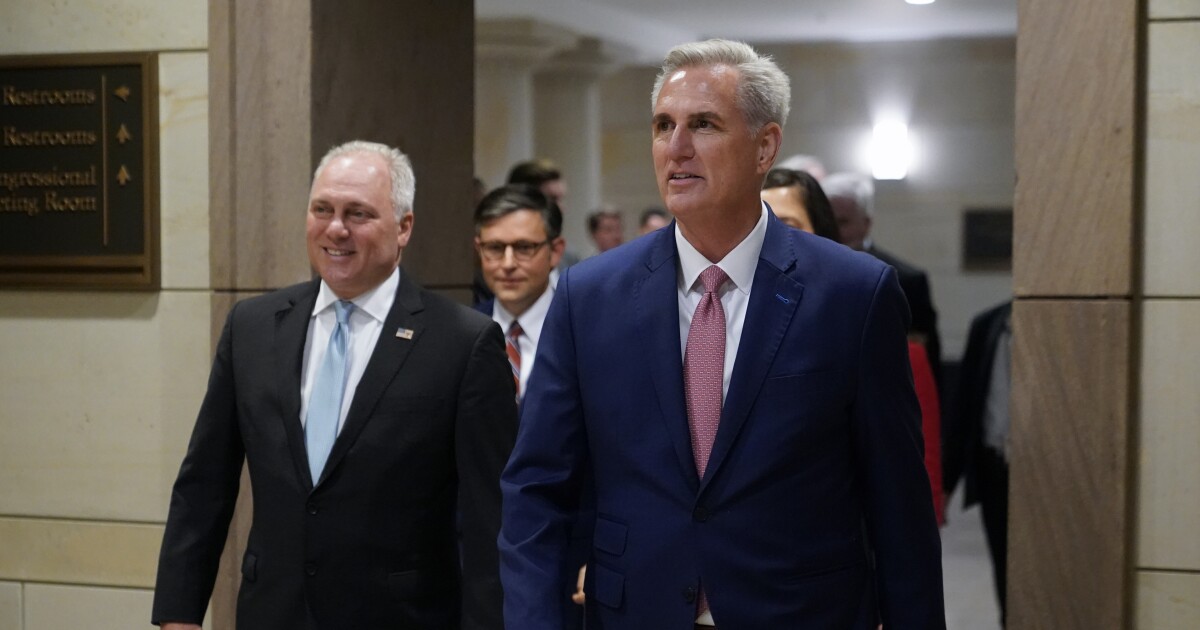

Vulnerable House Republicans running in some of the toughest races of the 2024 cycle outraised the most at-risk Democrats over the last three months, marking the second consecutive fundraising quarter the group of endangered GOP candidates was able to do so.
Both parties’ fundraising arms unveiled their top targets for the 2024 election cycle earlier this year, focusing their efforts on some of the most expensive midterm races that saw members win by only a slim margin. Democrats have a list of 33 target seats they hope to seize control of next year, with Republicans homing in on 37. Both lists have two open seats where the incumbents are not running for reelection.
GOP BALANCES ELECTION INTEGRITY AND STATES RIGHTS IN HOUSE VOTING BILL
The group of 31 targeted GOP incumbents seeking reelection raised an average of $776,620 per member compared to an average of just $498,662 for vulnerable Democrats, according to an analysis of campaign filings by the National Republican Congressional Committee.
Additionally, GOP front-liners have 61% more cash on hand than their Democratic counterparts, with vulnerable Republicans reporting an average of $1.2 million in their respective war chests, according to the NRCC. Meanwhile, endangered Democrats reported an average of $757,829 cash on hand per member at the end of the second quarter.
The report indicates some momentum for vulnerable Republicans, who have historically raised less money than House Democrats when taking all races into account. For example, the DCCC raised a record-breaking $37.7 million during the first quarter of this year, besting the NRCC, which raised $25.8 million.
“Democrats are poised to take back the majority next year and will have the resources to do it as indicated by the DCCC consistently outraising Republicans this year,” DCCC spokesperson Viet Shelton told the Washington Examiner.
Democrats have also pointed to a significant portion of the GOP fundraising that came directly from committees tied to House Speaker Kevin McCarthy (R-CA), suggesting the strong fundraising numbers being reported by vulnerable Republicans are slightly inflated. McCarthy transferred an average of $103,000 per vulnerable member directly to their campaigns, according to data compiled by the DCCC.
As a result, Democrats have expressed confidence in their ability to retake control of the House next year, pointing to recent intraparty tensions among the GOP as evidence of a fractured caucus.
“Vulnerable Republicans who’ve kowtowed to the most extreme members of their party such as Marjorie Taylor Greene know how endangered they are and that voters will hold them accountable,” Shelton said.
Meanwhile, Republicans cited their record-breaking fundraising numbers from the last cycle, noting the party will not only defend its vulnerable districts but also pick up a few extra seats to bolster its majority.
“House Republicans are united and on offense to grow our House majority,” NRCC Chairman Richard Hudson said in a statement. “Our team came together to put up historic fundraising numbers — led by an incredible effort from our leadership — showing Republicans will have the firepower to pick up seats.”
CLICK HERE TO READ MORE FROM THE WASHINGTON EXAMINER
All 435 seats are up for grabs in 2024 as Republicans seek to hold their slim majority in the lower chamber. Of these, 42 are considered competitive, with most of those held by Democrats compared to Republicans, giving the GOP a slight advantage as it prepares for the next election cycle.
However, of the 42 competitive seats, 18 are held by Republicans in districts that voted for President Joe Biden in 2020, compared to just five Democrats who must defend their seats in districts carried by former President Donald Trump. That means there are just enough vulnerable GOP-held seats to keep things competitive heading into the next election cycle.





